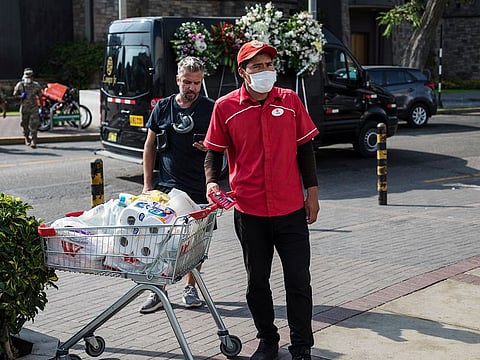Coronavirus: Latin America imposes military roadblocks, curfews
Peru deploys military, Costa Rica closes borders, Paraguay opts for curfew

Lima/Asuncion/San Salvador: Countries around Latin America tightened restrictions on Monday to slow the spread of the new coronavirus, with Peru deploying military personnel on the streets, Costa Rica closing borders and Paraguay imposing a curfew.
The region has yet to be hit as hard as Asia or Europe, and countries have moved aggressively to contain the virus that has shut down cities and international transport hubs and battered markets.
Nevertheless, not all of them are moving at the same speed, and a diplomatic tiff erupted when El Salvador’s president accused Mexico of allowing people with coronavirus to board a flight due to leave Mexico City for San Salvador.
In Peru, President Martin Vizcarra said leaders from Argentina, Chile, Uruguay, Paraguay, Bolivia, Colombia, Ecuador and Brazil spoke via conference call on Monday to analyze the situation and coordinate actions against the pandemic.
“We have agreed that together we are going to join forces,” he told reporters at the governmental palace, adding countries would look to coordinate demand for medical supplies and to calculate the economic impact on the region.
In Lima, masked military personnel blocked major roads, while police restricted the movement of people, as the country rolled out a state of enforced “social isolation”.
Peru has suspended constitutional rights such as free movement and assembly, though the government has assured it will guarantee the operation of supermarkets, pharmacies, banks, basic services and the transport of merchandise.
In nearby Paraguay, which has eight cases of the respiratory disease so far, the government said it would enforce a curfew from 8 p.m. daily to restrict crowds.
Certain people, including those doing vital work, delivering food or transportation could continue to move around, Paraguay’s Interior Minister Euclides Acevedo told a news conference.
Meanwhile Panama’s government said it had now reported 69 cases of coronavirus infection, up from 55 on Sunday.
Cornavirus has been slower to reach Latin America than much of the world. Some countries, including Mexico, have sought to minimize public disruptions. Others such as El Salvador have gone to considerable lengths to keep the virus out.
Salvadoran President Nayib Bukele said on Twitter he had information an Avianca flight from Mexico was due to take off with 12 coronavirus patients on board.
In response, Mexico’s foreign ministry questioned where Bukele had obtained his information and said Mexico had always acted with great responsibility on epidemics.
Avianca later canceled the flight. It was not clear if coronavirus patients were going to board the plane.
Venezuela entered the first day of a quarantine on Monday, imposed by President Nicolas Maduro to stop the virus. But many across the economically struggling country went out anyway, saying they could not afford not to work.
Chile cut interest rates to aid growth, while LATAM Airlines Group, South America’s largest carrier, cut 90% of international flights due to weak demand.
Chilean President Sebastian Pinera said his country, which has 155 confirmed coronavirus cases, would close its borders to foreigners starting on Wednesday.
Costa Rican President Carlos Alvarado declared a state of emergency that included shutting borders, and ordered educational authorities to close study centers for a month.
Guatemala suspended all flights and banned foreigners from entering the country for two weeks, while El Salvador and Honduras were in a state of near lockdown.
Honduras suspended various constitutional rights for a week, including freedoms of movement, speech and assembly.
Separately, fast food chain McDonald’s Corp said on Twitter it was shutting its stores in Guatemala and El Salvador until further notice, appending a message in Spanish: “Stay at home”.
Sign up for the Daily Briefing
Get the latest news and updates straight to your inbox


